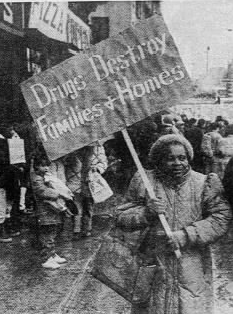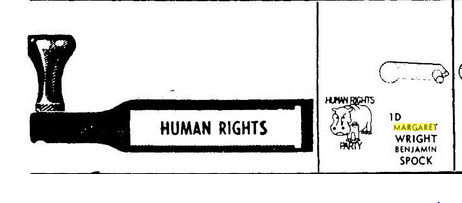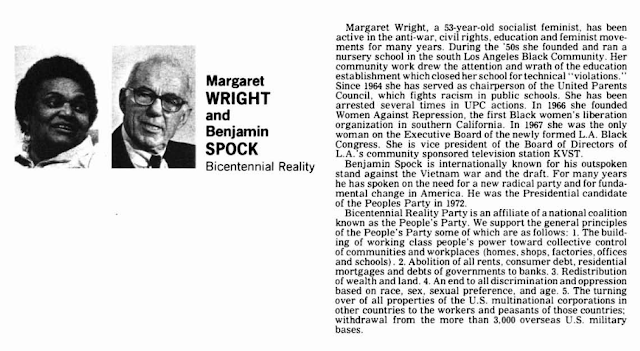Showing posts with label Maggie Kuhn. Show all posts
Showing posts with label Maggie Kuhn. Show all posts
Wednesday, March 11, 2020
Florence M. Rice
Florence M. Rice, March 22, 1919 (Buffalo, NY) -
VP candidate for Consumer Party (aka Independent) (1988)
Running mate with nominee: Eugene McCarthy (1916-2005)
Popular vote: 25,091 (0.03%)
Electoral vote: 0/538
The campaign:
The Pennsylvania-based Consumer Party had been around since the late 1960s as a statewide organization. In 1984 they endorsed the Citizens Party but in 1988 they were ready to try a national run with a goal of obtaining ballot status in over half the states. It didn't work out that way.
In 1988 they approached Eugene McCarthy, now 72, and asked him to be their standard bearer. It isn't clear if there was truly an official running-mate (McCarthy always had disdain for the office of Vice-President anyway and felt it should be eliminated), but it would appear Harlem legendary consumer advocate Florence M. Rice was the closest to being the choice of the Consumer Party.
The former liberal icon had changed quite a bit since his independent 1976 run for President. In 1980 he endorsed Ronald Reagan and later had some kind of financial connection with Right-wing cult leader Sun Myung Moon and his Unification Church.
It was apparent McCarthy viewed the nomination as an opportunity rather than a cause. He voiced a hope of broadening the campaign and going beyond the Consumer Party in an interview with the Chicago Tribune: "I'd just as soon have a new name. It's like the Know-Nothings and the Barn Burners. I'm hopeful some other groups will come in. We've had some calls from the National Unity people-they're a sort of a (John) Anderson organization. And maybe some independent parties from around the country. I don't know about the Socialists and Vegetarians. The Peace and Freedom people might come in. I don't think they have a candidate. They're a pretty wild bunch."
McCarthy proposed shortening the work week, curtailing or eliminating the FEC, raising tariffs, and creating a national sales tax on "wasteful, socially undesirable consumption, not just of cigarettes and liquor, but also of oversized, overpowered and overfueled automobiles."
McCarthy's quotes from the campaign:
There is no real choice between Democrats and Republicans. If any new direction is to come, it must come through an independent party, the Consumer Party, and I have willingly offered myself to lead it.
I don't expect to lose. Sure I've lost before, but I didn't feel I wasted my time, and I expect to have a significant impact.
There are two kinds of people who don't make good presidents-- vice presidents and governors.
We are being controlled, and conditioned, over-advertised, dominated by corporate power, by the media. You watch the evening news, where you are supposed to be getting your information. They give you 35 seconds of news and then they give you relief for hemmorhoids. We spend more on advertising than we do on education.
Responsible political participants should challenge absolutely the concepts and historical judgments now used to justify militancy and the arms buildup.
The perception that American politics should be conducted within the framework of only two parties is a misconception. It's against what the Founding Fathers intended.
On July 22, 1988 the Detroit Free Press mentioned McCarthy's running-mate in Michigan was Gray Panthers founder Maggie Kuhn (1905-1995). Kuhn had previously turned down an offer to run as VP for the People's Party in 1976 and was one of the co-founders of the Citizens Party in 1979. The backstory is not clear, but McCarthy had to go to court to have Kuhn's name replaced by that of Rice on the Michigan ballot.
Neither McCarthy or Rice seemed to have waged a high profile energetic campaign, with McCarthy seeming more disengaged than ever. I could not find a source to confirm McCarthy and Rice even met during the 1988 election season. When the media did cover McCarthy, which was not often, they spent most of their time treating him as the new Harold Stassen and a relic as they used more ink on his history than on his current platform. Several editorialists were not kind.
McCarthy was on the ballot in four states and a certified write-in for Arizona (apparently no VP with him there) and California. In total he had three running-mates and nationally earned 30,905 votes, placing sixth. The McCarthy/Rice ticket won 25,091 votes in three states: Pennsylvania 0.42% (they finished in third place there), New Jersey 0.11%, and Michigan 0.07%.
Rice's status as a third party VP ranks rather low on her long list of community-based and consumer activist accomplishments. As of this writing she remains a public figure about to turn age 101.
Election history: none
Other occupations: laundry worker, domestic seamstress, furniture store credit clerk, founder of the Harlem Consumer Education Council, pro-choice activist, teacher, elder abuse activist
Notes:
Parents immigrated from the West Indes
First third party VP I am aware of to live to 100.
Monday, January 6, 2020
LaDonna Vita Tabbytite Harris
LaDonna Vita Tabbytite Harris, February 26, 1931 (Temple, Okla.) -
VP candidate for Citizens Party (aka Independent aka Consumer Party) (1980)
Running mate with nominee: Barry Commoner (1917-2012)
Popular vote: 222,072 (0.26%)
Electoral vote: 0/538
The campaign:
The Citizens Party was formed in 1979 by a group of political progressives who were disenchanted with what they viewed as the corporate centrism of the Carter administration. The headliner and chief organizer was Barry Commoner, an academic and environmental scientist who had been an activist against nuclear power. Others involved in the founding of the Party included Gray Panthers leader Maggie Kuhn, Mario Savio, and Studs Terkel. The Washington Post said the Citizens Party was "blessed by Ralph Nader." Nader had apparently been offered the CP Presidential nomination, but turned it down. Former Yippie Abbie Hoffman also endorsed the Citizens Party as well.
The lengthy platform included disarmament of nuclear and chemical weapons, constrain multi-national corporations, wider use of the United Nations and World Court, open relations with Cuba and Vietnam, abolish the CIA, progressive taxation, encourage the growth of small business and co-ops, reduce the military budget, phase out nuclear power, national recycling program, public control of utilities, pro-choice, national health service, eliminate ROTC, increase minimum wage, pro-Affirmative Action, strengthen OSHA, pro-labor unions, national gun control, pro-ERA, no peacetime draft registration, rent control, development of mass transit.
The CP also ran candidates for the US House, US Senate, and local levels.
Commoner, the Presidential nominee, while not exactly a socialist did make an effort to link the abusive side of capitalism with environmental degradation. Today's eco-socialist movements embrace Commoner's writings as part of their philosophical foundation.
The Citizen's Party was not a huge blip on the radar in the news media during 1980 as I recall-- John Anderson had pretty much sucked all the air out the room for the other third parties. But I do remember the main stunt Commoner performed in the campaign to gain attention and make his point. No doubt from frustration for being squeezed out of the mainstream national discussion while attempting to bring up serious issues, the Citizens Party used shock talk and employed the campaign motto of "Bullshit" on radio ads. "Carter, Reagan, and Anderson: It's all bullshit," a voice declared, followed by Commoner saying, "Too bad people have to use such strong language, but isn't that how you feel too?" You have to remember this was in 1980 before profanity was so freely used by elected officials as it is today and public comments in the pre-Internet world didn't immediately sink to the lowest common language denominator.
In order to qualify for filing in the early states Wretha Wiley Hanson, the widow of and fellow agitator with civil rights activist George A. Wiley, was used as a stand-in running-mate for Kentucky and Ohio. Hmm. "stand-in running-mate" sounds like a contradiction in terms, how can one stand and run at the same time?
At the contentious Party convention (where the Black Caucus walked out) LaDonna Vita Tabbytite Harris was nominated as running-mate and on the ballot in all the other states where Commoner was running-- except in Tennessee. For some reason Commoner did not have a VP on the ballot with him in that state although all the other Presidential candidates there did.
As a Comanche, Harris was touted as the first female Native American Vice-Presidential candidate-- but that honor actually belongs to Ramona Frances Crowell, part of the Assiniboine people. Crowell was one of Dizzy Gillespie's running-mates in 1964. But Harris was certainly the first to have ballot status.
Harris was also connected with DC insiders by virtue of being the spouse of US Sen. Fred Harris (D-Okla.) at the time.
Although Wikipedia states "Commoner did not garner more than one percent in any state, the party received enough support to be the first minor party to qualify for federal matching funds (about $157,000) for the 1984 election," in fact the Party did win more than 1% in Oregon (1.15%), Vermont (1.09%), and DC (1.05%). I always love zinging Wikipedia on these details.
On the ballot or registered write-ins in 30 states, in addition to the three top percentages mentioned above, Commoner/Harris' other strongest results were: Maine 0.84%, Virginia 0.75%, California 0.71%, Washington 0.54% (which I think included my brother!), and Hawaii 0.51%.
Election history: none.
Other occupations: founder and President of Americans for Indian Opportunity, author, member of way too many boards and commissions to list.
Notes:
Harris invited controversy 2012-2019 by defending and adopting Johnny Depp when the actor was
under accusations of being a Pretendian, cultural appropriator, and perpetuating stereotypes of
indigenous Americans through his acting roles and advertisement appearances.
Endorsed Bernie Sanders in 2016.
Full disclosure: I supported Sen. Fred Harris for President at my caucus in 1976. Here in Washington
State the Scoop Jackson people had it all locked up, of course.
Brush with fame: I knew someone who once went a hike with Mario Savio. Those are the kinds of
brushes with fame I have.
Sunday, October 13, 2019
Benjamin McLane Spock
Benjamin McLane Spock, May 2, 1903 (New Haven, Conn.) – March 15, 1998 (La Jolla, Calif.)
VP candidate for National Conference for a New Politics (1968)
VP candidate for Peace and Freedom Party (1968)
VP candidate for People's Party (1976)
Running mate with nominee (1968): Martin Luther King (1929-1968)
Running mate with nominee (1968): Dick Gregory (1932-2017)
Running mate with nominee (1976): Margaret Nusom Wright (1922-1996)
Popular vote (1968): 1680 (0.00%)
Popular vote (1976): 49,016 (0.06%)
Electoral vote (1968, 1976): 0/538
The campaign (1968):
In early 1967 several Leftist activists had been attempting to convince Rev. Martin Luther King of making a run for President in 1968. In August 1967 at a convention held by a loose alliance of progressive and civil rights groups called the National Conference for a New Politics, Rev. King and Dr. Benjamin Spock were nominated as a Presidential ticket. The group never met again. King refused to fully embrace the electioneering idea and was assassinated before any effort could be seriously pursued.
Meanwhile, after his unsuccessful run for Mayor of Chicago in 1967 as an independent, comedian and activist Dick Gregory wanted another try at elected office and decided to run for President as an outsider. As he said in an interview during the 1968 campaign, "I feel the two-party system is obsolete. The two-party system is so corrupt and immoral that it cannot solve the problems confronting the masses of people in this country. I did agree to accept the nomination in various states from independent organizations who had already had a position on the ballot and this why I have accepted."
Gregory ran in several states as a write-in or sometimes showed up on the ballot itself, under the banner of multiple political parties, with various running mates. No matter what the platform of the party he was using as a vehicle, Dick Gregory was still Dick Gregory.
When the newly created Peace and Freedom Party held their first chaotic convention, Dick Gregory was outvoted in the nomination process by Black Panther Party leader Eldridge Cleaver. In Pennsylvania and Virginia, Gregory was run under the Peace and Freedom Party banner anyway, with anti-war Dr. Benjamin Spock as his running mate. Spock managed to withdraw from the Pennsylvania ticket, replaced by Mark Lane. This left Virginia as the only state where this team was presented and Spock was considered a "stand-in" until someone else came along. But someone else did not come along.
Before Dr. Spock became known as a Leftist activist, he was already a celebrity as the author of the national best-seller Baby and Child Care (1946). The book came back to haunt him during the Youth Rebellion of the late 1960s/early 1970s, with many on the conservative side blaming Spock's promotion of "permissiveness" as one of the causes of the Generation Gap. Spock regarded these attacks as ad hominem and groundless.
The Gregory campaign placed 5th nationally (outpolling Cleaver) with 47,149 popular votes (0.06%). The Gregory/Spock ticket earned 1680 (0.12%) popular votes in Virginia.
The campaign (1976):
The People's Party was a confederation of minor parties, mostly local. In 1976 those parties included the Peace and Freedom Party (Calif.), Human Rights Party (Mich.), Vermont Liberty Union, and the Bicentennial Reality Party (Wash.)
The Presidential nominee was Margaret Wright, who was radicalized during union activity as a "Rosie the Riveter" worker for Lockheed during WWII. She later became a civil rights activist and by the late 1960s was the Black Panther Party Minister of Education. In 1976 the People's Party nominated Wright for President and Gray Panthers founder Maggie Kuhn (1905-1995), an activist for seniors, as her running mate. Kuhn declined, so the 1972 People's Party Presidential nominee, Dr. Benjamin Spock was selected as the replacement Vice-Presidential choice.
Wright scraped up enough money to make campaign visits in her old Ford station wagon. The ticket was on the ballot in six states. Wright wanted to be on the ballot in the Green Mountain State under the banner of the the Vermont Liberty Union Party (which was running Bernie Sanders for Governor in 1976) but could not file for want of the $1000 fee required.
The final popular vote results for the Wright/Spock ticket: California (Peace and Freedom Party) 0.53%, Michigan (Human Rights Party) 0.10%, Washington (Bicentennial Reality Party) 0.07%, Wisconsin (Independent) 0.04%, Minnesota and New Jersey (both People's Party) 0.03% each. California provided 41,731 of their national 49,016 tally.
Election history:
1968 - Peace and Freedom Party nomination for US President - defeated
1968 - Freedom and Peace Party nomination for US President - withdrew
1972 - Democratic Party nomination for US Vice-President - defeated
1972 - Liberal Party nomination for US President - defeated
1972 - US President (People's Party) - defeated
1980 - Peace and Freedom Party nomination for US President - defeated
Other occupations: doctor, author, honorary co-chair (with Gore Vidal) of the New Party.
Buried: Seaview Cemetery (Rockport, Maine)
Notes:
I am told I was raised by the precepts of Spock's book and here I am running a blog about third party Vice-Presidential candidates so obviously I turned out quite normal.
Subscribe to:
Comments (Atom)
























